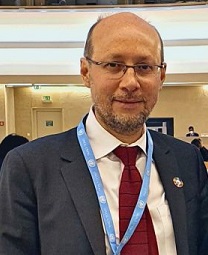
UN Rapporteur raises alarm on mercury use
The United Nations Rapporteur on Toxics and Human Rights, Marcos Orellana, has expressed concern about the increasing use of mercury across the country and its human rights implications.
He has consequently advised government to adopt strong measures of control, including a ban on the trade and use in mercury, address mercury use as a form of environmental crime, and to champion amendments to strengthen the Minamata Convention on Mercury.
"Mercury is a highly toxic metal that is persistent, can cross the human placenta, affects neurodevelopment of children, and causes a range of health problems, including terminal diseases such as cancer.
“Over the course of my visit, many of my interlocutors told me that mercury is actually everywhere in Ghana. While the importation of mercury is controlled in Ghana by law, the substance makes its way into the country through a well organised black market, hence remaining easily accessible," he said.
Mr Orellana expressed the concerns in his preliminary observations on the country's human rights situation in relation to toxics and hazardous substances at a media briefing in Accra last Tuesday.
14-Day visit
Mr Orellana is in the country for a 14-day visit at the invitation of government to collect and access first hand information on issues under his mandate and to offer constructive recommendations to the government and other stakeholders.
The full report of his visit is expected to be presented to the UN Human Rights Council in September 2023.
The issues he examined while in the country included the use of mercury in small scale mining, the use of pesticides and fertilisers, electronic waste and contamination of used clothes.
He expressed concern that workers in small scale mining industry used mercury without being fully informed of the high risks of the substance on human health and the environment.
"A miner I spoke to told me he had been using mercury indoors and at home without protective equipment. In addition, at times mercury is used close to water streams, contaminating water bodies, ecosystems and the food chain. Large scale gold mining activities has contaminated lands previously used for cultivation. Mercury, zinc and arsenic have resulted in toxic water pollution," he said.
E-waste
He said the informal sector in the country handled 95 per cent of electronic and electric waste, otherwise known as e-waste, adding that during his visit to Agbogbloshie, considered one of the biggest e-waste dumpsites in the world, he witnessed the absence of protective equipment on workers, high risks of work accidents and human infringements due to the high level of toxicity and the poor conditions of the e-waste site.
“All workers I have witnessed conducting these activities were doing so without adequate personal protective equipment, in most instances with their bare hands, wearing jeans and open shoes without masks preventing them inhaling the highly toxic smoke generated from e-waste fires.
“Hazardous substances, including arsenic, lead, mercury and copper, have also been detected in the soil, water, ash, sediment and dust collected from the Agbogbloshie site,” he stated.
Pesticides, fertilisers
On pesticides and fertilisers, Mr Orellana said the increased use of agrochemicals by farmers with limited knowledge in safety precautions, lack of personal protective equipment, usage above recommended proportion and the impacts on crops and the food chain raised concerns.
He said some of the pesticides used in Ghana such as atrazine, paraquat and chlorphrifos had been banned for use in Europe because they were hazardous to human health and the environment.
“It is also alarming that one of the most widely used pesticides in the country is glyphosphosate, locally known as Kondem, which the World Health Organisation’s International Agency for Research on Cancer has classified as ‘probably carcinogenic to humans’,” he added.
He, however, commended Ghana for ratifying all international agreements on chemicals and wastes, and for measures put in place to check them.
The President of the Ghana Journalists Association, Albert Kwabena Dwumfour, said toxic exposure had direct consequences on the enjoyment of human rights, impacted people’s lives, health and livelihood, and that journalists could not practice in an environment that was exposed to such toxic and hazardous substances.
He urged journalists to identify and report activities that produced toxic substances in communities.
